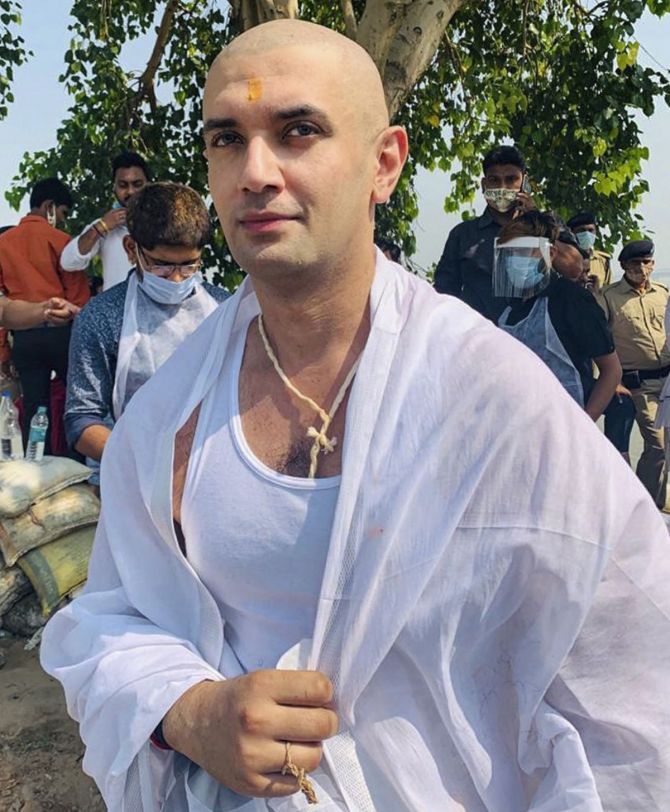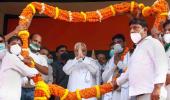'We can't underestimate future threats.'
Aditi Phadnis reports.

In the run-up to the Bihar assembly election, the death of Ram Vilas Paswan, leader of the Lok Janashakti Party, has left a big void. How will this affect the outcome of the election? And the politics of the state?
Straightforward questions. But in Bihar, everything is complex and nothing is as it appears to be.
Even while Paswan was alive, his 37-year-old son Chirag (who has been running the party for the last year or so for all practical purposes) had announced the LJP would stay in the National Democratic Alliance and support the Bharatiya Janata Party, but would oppose the Janata Dal-United with all its strength.
This decision caused many players to reset their political calculations: The LJP was widely seen as the BJP's Trojan horse, the force that would reduce the JD-U's numbers and would give the BJP the much-needed edge to turf out Nitish Kumar's party from government -- or sideline it, at the very least -- after the election results.
Recent evidence suggests while the BJP will not hesitate to use the LJP for its own purposes, the LJP's very existence is a clear and present danger to the BJP's expansion in Bihar.
The back story
When Paswan launched the LJP in 2000, it was seen as a party of the Dalits, specifically the sub-caste Dusadh -- numerically only about 2 per cent of Bihar's population.
A study by the Centre for Developing Societies says 65 per cent of the Dusadhs voted for the LJP when it contested on its own in the 2005 assembly elections. Since then, a majority of the caste has voted for the alliance the LJP has joined before elections.
In the 2015 assembly election, 51 per cent of Dusadhs voted for the NDA, making it a grateful recipient of votes it might not normally have got.
The LJP thus came to represent a vote bank.
Largely, this was a result of Paswan's connect with people. Dr Manisha Priyam, a scholar whose work on Bihar and Jharkhand politics is extensive and acclaimed, recalled: "I was in Hajipur during an election, doing fieldwork and Paswan's campaign was on. The response was electrifying."
"I remember the crowd holding up an old woman, insisting Paswan meet her. 'Iske sar par haath rakh deejiye, yah theek ho jayegi (Put your hand on her head,' they demanded. She had cancer. Few leaders had that kind of following."
The rise of the LJP was a direct result of the decline of the Congress as a political force in the state. But Paswan had an added advantage. He had been associated with the Socialist stream -- ranging from Karpoori Thakur to Lalu Prasad and Nitish Kumar -- and knew the thinking.
So his appeal was not just to his caste, though it appeared that way. His party gave tickets to many other castes.
"While he represented the Dalits, he was not a Dalit leader," said Priyam. Other Dalit castes did not really recognise him as their leader.
In this, Nitish Kumar spotted an opportunity. When he floated his idea that there should be a coalition of Ati-Pichhere (Extremely Backward Castes), he was appealing to those who had been neglected by the likes of Paswan.
This was an undeniable assault on the LJP's base. Paswan took it in his stride. But the doors of the LJP were always open for those who resented Kumar's dominance.
The rise of the young
Chirag, however, was having none of it. Hotheaded, young and ambitious, he felt the party should strike out on its own.
For the upcoming election, so far, the party has given 42 nominations. Of these, eight each are to candidates from the Bhumihar and Rajput castes.
Paswans are only six and Muslim one; the remaining tickets have been given to people from other castes.
Rebels from other parties, including the BJP, have been welcomed: To the point where three BJP rebels, who are now contesting on the LJP symbol, have been told if they persist in their course, they will face terrible consequences.
"Paswan earned his spurs as a representative of the poor and the marginalised. Although he was a Dalit, he never indulged in politics of anti-upper casteism," pointed out Rakesh Sinha, a BJP MP in the Rajya Sabha from Bihar.
"Therefore, he enjoyed the goodwill of the upper castes." The BJP, Sinha added, enjoys popular support and is the only party that has a pan-Bihari organisational setup, giving the NDA a clear edge.
Ram Vilas Paswan, Nitish Kumar and Lalu Prasad Yadav came from a common political stock. Tejaswi Yadav, Chirag and Nityanand Rai have little common space -- the position of the GenNext leader in Bihar is up for grabs.
"In Chirag, we have created a monster," confided a senior BJP leader.
He cited an example: "It was 2012 and Modiji had come for the funeral of Kailashpati Mishra to Patna. Usha Vidyarthi was a die-hard Modi supporter. She clambered on to a pile of boxes to get a glimpse of Modi. Someone warned her that she might fall. She retorted 'So what! if I fall it will be at Modiji's feet. Today, she is contesting as an LJP candidate. We can't underestimate future threats."












 © 2025
© 2025